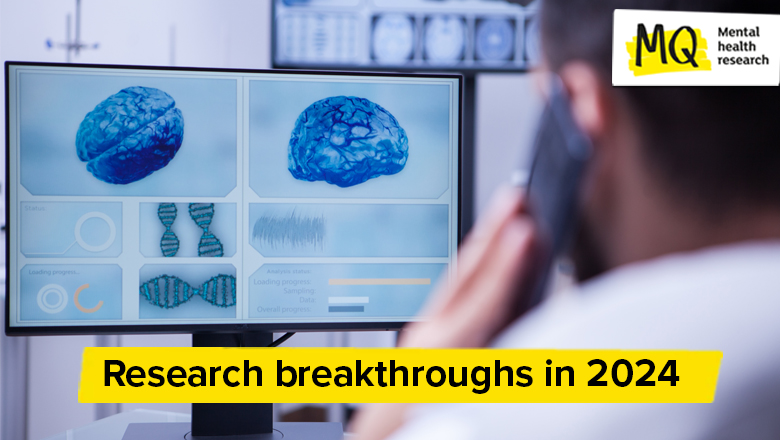As we approach the end of 2024, it’s an opportune moment to reflect on the significant advancements achieved in the field of mental health research throughout the year. From pioneering studies to revolutionary treatments, the unwavering commitment of researchers and mental health professionals has brought us closer to a comprehensive understanding of the myriad challenges faced by individuals struggling with mental health issues.
In this retrospective analysis, we will highlight some of the most impactful outcomes stemming from MQ’s initiatives and broader mental health research in 2024.
Discovering Effective Treatments for Psychosis: What Works?
Psychosis affects approximately 7.2% of the population and can be an extremely distressing condition. It is essential to identify which new treatments are effective for different individuals, especially with the influx of new options available.
Identifying Ineffective Treatments for Psychosis
The GALENOS study, conducted by Oxford University and funded by Wellcome, with support from MQ and various global partners, is a significant initiative in this area. As part of the first of many Living Systematic Reviews (LSR), GALENOS examined existing evidence regarding a specific treatment known as TAAR1 Agonists. The findings revealed that this treatment had minimal impact on alleviating psychosis symptoms.
Promising New Treatment for Certain Individuals
Conversely, a groundbreaking study in the United States introduced a novel treatment named Cobenfy (KarXT), marking the first new medication for treating schizophrenia in half a century. Preliminary trials indicated that Cobenfy significantly alleviated psychotic symptoms over a five-week period for some participants. This drug has received approval for use in the USA and is currently undergoing evaluation in the UK.
Exploring Universal Treatment Effectiveness for Psychosis
Further research is vital to uncover treatments that can effectively address psychosis for all patients. MQ is backing another research initiative from Oxford University, funded by Wellcome, called PUMA. This comprehensive 30-month project aims to compare various psychosis treatments to ascertain which is the most effective. For more detailed information, you can learn more here.
Evaluating the True Value of Effective Mental Health Treatments
While the development of new mental health treatments can be costly, the profound benefits for individuals experiencing transformative changes in their lives cannot be overstated. Therefore, at the beginning of the year, MQ collaborated with Pro Bono Economics to assess the economic value of two innovative treatments. This partnership aims to illustrate the significant impact that making these treatments widely accessible could have on the health sector and society at large.
The Economic Impact of ADIE Treatment
ADIE (Aligning Dimensions of Introspective Experience) is a newly developed treatment designed to assist autistic individuals suffering from Generalised Anxiety Disorder (GAD). The report indicated that granting access to ADIE for all autistic individuals facing GAD in the UK could result in at least temporary recovery for nearly 6,000 individuals. The enhancement in their quality of life during a year of recovery could translate into an economic benefit valued between £125-£170 million, or roughly £21,000 to £28,000 per person.
The Economic Benefits of LENS Treatment
LENS (Learning Effective New Strategies) is a remote treatment program aimed at facilitating recovery for those affected by GAD. The report found that if LENS were implemented for the 1.4 million individuals in the UK in need, the improved quality of life they could experience might yield an astounding £2.9 billion in economic advantages.
Examining the Internet’s Influence on Mental Health
In October, MQ, in partnership with Melbourne University, Harvard University’s Digital Psychiatry Institute, and researchers from the Oxford Internet Institute, published a groundbreaking report investigating the effects of the internet on the mental health of young people.

The report indicated that while social media use cannot solely be blamed for the increase in mental illnesses among youth, tech companies still bear significant responsibility for ensuring the well-being of young users. It was noted that extensive internet use does not inherently harm young individuals; rather, it is the nature of their online experiences that can significantly influence their mental health and overall well-being.
Internet usage can negatively affect mental health if it interferes with healthier habits, such as sleep, academic responsibilities, physical activities, and in-person interactions. Such disruptions can hinder cognitive function, emotional regulation, academic performance, self-image, and social relationships. Conversely, online activities can also replace detrimental behaviors, such as excessive rumination, feelings of loneliness, and negative emotions.
Additionally, the report highlighted the urgent need for tech companies to establish protective measures to ensure that their platforms are safe for young users, especially with the rapid emergence of new technologies like AI and quantum computing.
Advancing Research Initiatives for Mental Health
The UK Government is committed to positioning the UK as the leading destination for innovation in life sciences. MQ is actively contributing to this objective by promoting Patient and Public Involvement, Engagement and Participation, commonly referred to as PPIE.
The Innovative Mental Health Mission
The Mental Health Research for Innovation Centre (M-RIC) in Liverpool has unveiled its 2024 online annual review, showcasing its accomplishments from the past year and outlining the centre’s exciting plans for the future. The review includes a new animation providing a concise overview of M-RIC, interactive graphics highlighting key statistics and milestones achieved in 2024, updates on their six research work packages, insights into their latest patient and public involvement and engagement initiatives, and a preview of their plans for 2025.
You can access the review here and the animation here.

Exploring the Development of Eating Disorders
Eating Disorders can be some of the most debilitating mental illnesses, yet our understanding of how these disorders manifest remains limited. Avoidant Restrictive Food Intake Disorder (ARFID) primarily impacts children and is typically not associated with body image concerns.
In September, researchers at MQ published their findings on the genetic factors that may contribute to food fussiness. By gaining insight into how genetics can shape children’s relationships with food, we hope to enhance our understanding of how ARFID develops.
Innovative Research on Post-Traumatic Stress Disorder (PTSD)
MQ was established with the mission to deepen our understanding of how mental health conditions develop, enhance treatment effectiveness, and ultimately prevent mental illnesses. This year, our research is paving the way for breakthroughs that could significantly benefit individuals grappling with Post-Traumatic Stress Disorders (PTSD).
Gaining Insights into PTSD Risk Factors
PTSD typically arises following a traumatic event, which can occur in various forms, including a singular incident like an act of violence or an ongoing situation, such as an abusive relationship. Understanding why certain individuals develop PTSD while others do not is crucial for prevention efforts.
For instance, MQ researchers discovered that some refugees applying for asylum in Australia exhibited PTSD symptoms during the application process, while others did not. Notably, refugees processed in offshore detention centers were 20 times more likely to develop PTSD compared to those not subjected to such conditions.
In a separate study, researchers from the University of East Anglia investigated why some children who experienced trauma later developed PTSD while others did not. Their findings indicated that cognitive psychological factors—specifically how children remember the incident and perceive themselves afterward—are the strongest predictors of adverse mental health outcomes following trauma.
Enhancing PTSD Treatment Approaches
One of the most distressing symptoms of PTSD is the intrusive memories of trauma, commonly referred to as flashbacks. Professor Emily Holmes, one of MQ’s founding trustees and the current Director of the MQ Foundation, has devised a single-session treatment specifically for frontline healthcare workers who developed PTSD during the COVID-19 pandemic. This innovative treatment involves playing the computer game Tetris, which has been shown to reduce the occurrence of flashbacks.
Strategies for Preventing Trauma
Through extensive research, MQ is actively contributing to the evidence base that informs policymakers about effective strategies for protecting mental health. Earlier this year, MQ played a pivotal role in the report from the Cross-Party Parliamentary Group for a Fit and Healthy Childhood, advocating for a national strategy focused on trauma.
Particularly, the report emphasized strategies to mitigate Adverse Childhood Experiences that can lead to the onset of PTSD and other mental health conditions, including depression and GAD.
Anticipating Mental Health Research Developments in 2025
As we look toward 2025 and the dawn of a new era with our incoming CEO, numerous research milestones, initiatives, and events are on the horizon. There is a wealth of groundbreaking research from MQ and our collaborators slated for the upcoming year. Here are just a few highlights to look forward to:

Professor Valeria Mondelli, the lead of the IDEA Flame project, will be publishing a paper in January in the Journal of Biological Psychiatry regarding her findings on the correlation between inflammation and depression in adolescents.
Click here to read some of the team’s early insights.

MQ will also launch its first EU Horizon-funded project, SYNAPSING, which investigates the connections within neurons and their functional dynamics in mental health.

The ATLAS of Longitudinal Datasets will launch in January. This innovative, web-based platform will serve as a searchable repository that maps thousands of longitudinal datasets from across the globe.
The ATLAS will significantly enhance the accessibility and discoverability of longitudinal data across essential scientific fields, including mental health.

In early 2025, we will also receive findings from our Transdisciplinary Grants, which supported mental health research across diverse scientific disciplines.
Stay informed about these exciting projects and be the first to learn about new research by visiting our insights page or signing up for our newsletter to receive all the latest updates.
Explore Additional Ways to Support Our Mission
Fundraise for Mental Health Research

Organize a fundraising event to raise money for vital mental health research.












